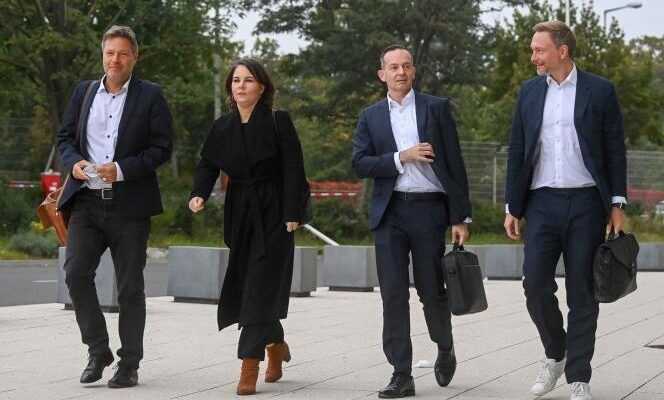Europeans have their eyes riveted on the negotiations which are beginning between the Social Democrats (SPD), the Greens and the Liberals (FDP) with a view to forming a so-called “traffic light” coalition in Germany. One point, in particular, is considered decisive for the rest of the community adventure: the name of the next finance minister, while two men with divergent positions – the ecologist Robert Habeck and the liberal Christian Lindner – are favorites for this highly strategic portfolio.
Whatever it is, the incumbent will of course not have a completely free hand. First, because it will be bound by the “coalition contract” on which the three parties of the future majority will have agreed. Then, because he will be placed under the authority of a chancellor – Olaf Scholz (SPD) – who will necessarily have a close watch on this ministry which he has been leading since March 2018.
Nevertheless: the future German Minister of Finance will weigh with all his weight on two subjects which will be at the heart of European concerns over the coming months and which will be decisive for the future of the Twenty-Seven: on the one hand, the Green Deal, with the many laws being drafted which should allow the European Union (EU) to achieve carbon neutrality in 2050; on the other hand, the Stability and Growth Pact, which has been suspended to allow member states to deal with the Covid-19 crisis and which must be reinstated in January 2023.
Two opposing scenarios
If the finance ministry falls to the Greens, who are proposing a ten-year investment plan of 500 billion euros for the decarbonization, digitization and modernization of infrastructure in Germany, Berlin will have to rely on accommodating European fiscal rules , more than those which defined the stability pact until the pandemic. From this point of view, the German Greens are in phase with France, Italy and Spain, who are campaigning for an in-depth reform of the stability pact, so that it does not slow down investments intended to support the transitions. ecological and digital technologies of Europe.
If, on the other hand, it is the Liberals who get the finance portfolio, the message to Europe will be quite different. The Netherlands and the other “frugal” states (Denmark, Sweden, Austria), which want a rapid return to budgetary orthodoxy, will feel comforted. The FDP is indeed clearly their ally, as much as it is the nightmare of the most indebted countries in southern Europe. They remember the positions of its president, Christian Lindner, during the crisis in the euro zone. “I ran into him at a dinner party a few years ago, and the first thing he said was that German workers should not have their savings paying for the citizens of my country.”, confides a diplomat from a Mediterranean country.
You have 52.17% of this article to read. The rest is for subscribers only.
